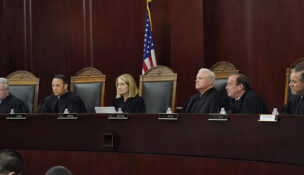‘Revenge porn’ law challenged by bookstores, photographers and librarians
Ben Giles//September 23, 2014//[read_meter]
‘Revenge porn’ law challenged by bookstores, photographers and librarians
Ben Giles//September 23, 2014//[read_meter]
 The American Civil Liberties Union warned Arizona lawmakers it had problems with a bill designed to criminalize “revenge porn,” and are now those problems are the basis of a court challenge arguing that the law is unconstitutional.
The American Civil Liberties Union warned Arizona lawmakers it had problems with a bill designed to criminalize “revenge porn,” and are now those problems are the basis of a court challenge arguing that the law is unconstitutional.
The ACLU announced Tuesday that it has filed a lawsuit in federal court challenging that the revenge porn bill violates First Amendment rights. A coalition of bookstores, publishers, media groups, librarians and photographers – including Changing Hands Bookstore of Tempe and Phoenix, as well as Voice Media Group, publisher of the Phoenix New Times, are named as plaintiffs in the case.
ACLU attorneys argue that the law is too vague, and could lead to potentially broad applications that may result in felony convictions punishable by roughly four years in prison.
The bill’s advocates have argued that its intent is to criminalize the act of sharing or publishing lewd images of someone without their permission – punishment aimed at stopping jilted lovers from exacting revenge by posting compromising photos online, which the bill’s chief sponsor, Chandler Rep. J.D. Mesnard, said disproportionately occurs to women.
But “the law isn’t limited to revenge,” ACLU officials stated in a press release. “A prosecutor need not prove that the person publishing the photograph intended to harm the person depicted. Likewise, a person who shares a photograph can be convicted of a felony even if the person depicted has no expectation of privacy in the image and suffered no harm.”
Gayle Shanks, owner of Changing Hands Books, said “there are books on my shelves right now that might be illegal to sell under this law.”
Mary Anne Franks, a University of Miami law professor and a board member on the Cyber Civil Rights Initiative who advised lawmakers drafting the Arizona revenge porn bill, said the ACLU is deliberately making a misleading argument about the law’s application.
“They know it’s not accurate to say there’s no intent requirement here, because their absolutely is. You can’t accidentally do what the law prohibits,” Franks told the Arizona Capitol Times.
Franks compared the statute to existing laws on voyeurism and surveillance.
“There’s hardly ever a clause that says the only reason unlawful surveillance should be a crime is if there’s intent to harm,” she said.
Franks did suggest that the law be amended to include a public interest exception – language she encouraged Mesnard to include in the bill earlier this year, but which was removed before its passage. Such language would provide a broader range of exemptions for the use of sexually explicit images and may address some of the ACLU’s issues.
But Franks described most of the ACLU’s concerns with the law as “First Amendment bumper-stickering.”
“It’s kind of the cheapest possible way of casting this whole question,” she said. “Just because you can think of examples where this would be overly broad or would in fact infringe upon potentially protected free speech doesn’t mean the statute is unconstitutional.”
Franks cited the U.S. Supreme Court’s decision in Broadrick v. Oklahoma, which dealt with hypothetical scenarios of laws infringing on rights, as the ACLU suggests Arizona’s revenge porn law may.
“It can’t just be that you have hypothetical scenarios that might happen. The court asks whether or not they are significant with regard to what harm is being prevented by the statute. So, it’s not nearly as clear as the ACLU would like to make it out,” she said.
Mesnard, who championed the bill at the Capitol earlier this year, said he and other lawmakers opposed including intent-to-harm language because it would weaken the law.
“I don’t see any middle ground here. If you add that… you have essentially neutered the bill,” Mesnard said. “If we’re going to do that, then let’s just admit we’re not going to have a law that’s really going to help in those situations where mostly young women are being abused in this way.”
Mesnard said he was open to considering adding, as Franks suggested, a public interest exception to the law come January, when the 2015 legislative session begins.
















